Deposits sucked out of banks, interest rate pressure increases again
While trying to reduce lending interest rates, the State Bank also admits that pressure on interest rates is increasing. Credit is growing rapidly, while savings deposits are facing fierce competition from other investment channels, such as real estate, gold, stocks, etc.
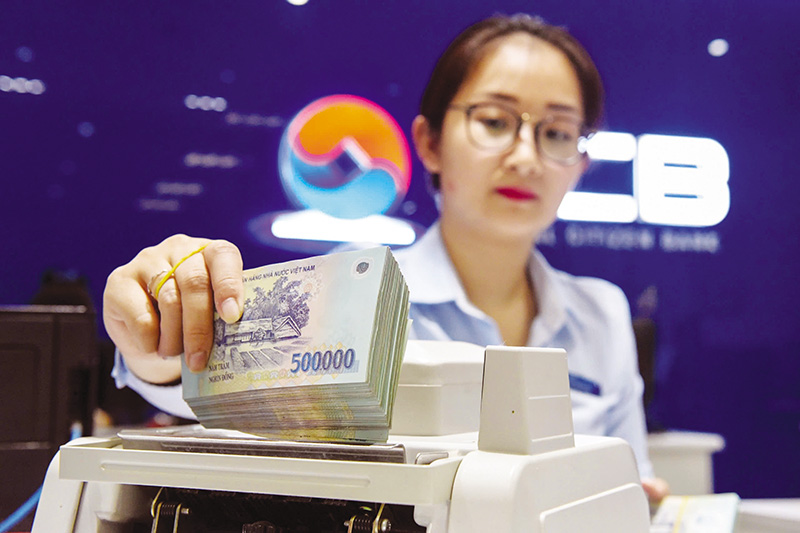 |
The State Bank's report shows that in January 2025, capital mobilization from residents and economic organizations of the entire banking system grew negatively (down 0.75% compared to the end of 2024). In the first month of the year, although residential deposits still increased by VND 123,000 billion, it could not compensate for the decrease of VND 233,000 billion from economic organizations (down 3.04% compared to the previous month). Thus, after 5 consecutive months of increase, capital mobilization from economic organizations recorded a decrease.
Speaking to Dau Tu Newspaper reporters, the Deputy General Director of a large joint stock commercial bank said that the bank has been making great efforts to mobilize capital again since the beginning of 2025 to prepare capital sources for growth. The growth rate of capital mobilization is higher than the same period last year, but still lower than credit growth. The bank's observations also show that a large amount of deposits are shifting to gold and real estate.
According to the General Statistics Office ( Ministry of Finance ), by March 25, 2025, capital mobilization of credit institutions increased by 1.36%, credit of the whole economy increased by 2.49%. Thus, as of March 25, the gap between mobilization and lending of the banking system has reached 1.1 million billion VND. By this time, the gap may be higher.
Gold has continuously broken historical peaks, real estate prices have skyrocketed since the beginning of the year, while savings interest rates remain low, making many people impatient. Fomo syndrome (fear of missing out) has caused many people to switch from saving to gold and land, regardless of the risks.
In a report recently sent to the National Assembly's Economic and Financial Committee , the State Bank admitted that interest rates will face many pressures in the coming time.
First, lending interest rates have fallen sharply in recent times.
Second, the demand for credit capital for production, business and consumption is expected to increase strongly in the coming time to meet the economic growth target for 2025, while capital mobilization of the entire credit institution system may be affected and compete with other investment channels, such as real estate, gold, and the stock market.
Third, global interest rates tend to decrease, but remain high and global financial markets are unpredictable after the US imposed reciprocal tariffs on countries.
From the time the State Bank met with commercial banks (February 25, 2025) to early April 2025, 26 banks lowered their deposit interest rates by 0.1-1.05%, depending on the term. However, on average, the deposit interest rates of banks have not decreased significantly. Accordingly, the average lending interest rate for new transactions of commercial banks by the end of March 2025 only decreased by 0.2%/year compared to the end of 2024.
Mr. Tran Minh Binh, Chairman of the Board of Directors of VietinBank, said that in 2025, interest rate pressure on the State Bank and the credit institution system will certainly be greater than last year.
“Interest rates have increased slightly since last year and are still on an upward trend,” said Mr. Binh.
Although the interest rate level at VietinBank is still under control, VietinBank's leaders believe that with the current interest rate developments, the bank's net interest margin (NIM) will be under downward pressure in 2025. The reason is that capital costs tend to increase, while the bank continues to implement preferential credit packages and support programs for businesses and people according to the policies of the Government and the State Bank.
Previously, Deputy Governor of the State Bank Dao Minh Tu also affirmed that the banking sector lends more to the economy than the mobilized balance, the shortfall must use both equity capital and re-lending capital from the State Bank.
In the context of capital need to expand growth, many banks are increasing capital with record high stock dividend rates. For example, Vietcombank set the stock dividend rate at 49.5%. This figure at VietinBank is 44.64%, at MSB is 20%.
During this year's general meeting of shareholders, most banks presented shareholders with plans to increase capital, such as MB paying dividends in shares at a rate of 32%, helping to increase charter capital. NCB has been approved by shareholders to increase charter capital by an additional VND7,500 billion through the offering of 700 million individual shares, equivalent to 59.42% of NCB's charter capital at the time of offering. VietABank presented a historic capital increase plan (increasing by 115%, from VND5,399.6 billion to VND11,582.4 billion...
In addition, banks are also actively issuing bonds to raise capital. According to statistics from the Vietnam Bond Market Association, from the beginning of the year to mid-April 2025, bond issuance reached VND41,621 billion, of which more than 60% of the value belonged to the banking group.
FiinGroup analysts believe that although many banks have plans to increase equity capital (tier 1 capital), increasing tier 1 capital takes a long time and depends on the stock market situation. Therefore, banks will continue to aggressively issue bonds in the coming time to meet credit growth requirements as well as capital safety indicators.
The State Bank's report shows that in January 2025, although capital mobilization from the population and credit institutions decreased, the total means of payment of the whole system still increased by 1.46%. This shows that the issuance of valuable papers by credit institutions continues to increase in the context of capital mobilization showing signs of decline.
Bank profits challenged by tariff policy
Although improved credit in the first quarter had a positive impact on business results, the challenge of full-year profits still lies ahead.
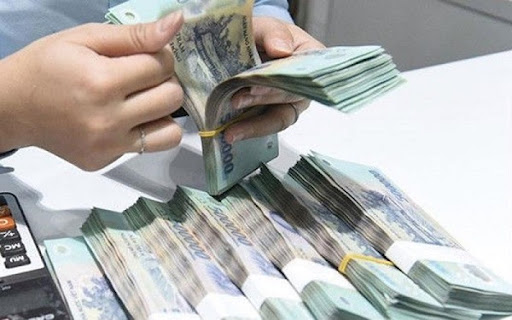 |
MB temporarily took the lead with nearly VND 8,400 billion in consolidated pre-tax profit in the first quarter of 2025, up 45% over the same period last year. With this result, MB is currently the bank with the highest profit in the industry, while Vietcombank has not announced its business results. This is also the highest quarterly profit in MB's history.
Ms. Nguyen Duc Thach Diem, Standing Vice Chairman of the Board of Directors and General Director of Sacombank, said that the bank's pre-tax profit was VND3,674 billion in the first quarter of this year, an increase of 38.4% over the same period, equivalent to 25.1% of the yearly plan.
For HDBank, pre-tax profit in the first 3 months of the year reached VND5,355 billion, an impressive increase of 33% compared to the same period last year (VND4,028 billion). With this growth rate, HDBank has surpassed ACB and VPBank, becoming the second highest profit private bank in the system, just behind Techcombank.
Meanwhile, ACB estimated pre-tax profit in the first quarter of 2025 at VND4,600 billion, down 6% year-on-year, mainly due to the Bank proactively implementing preferential interest rate programs to support customers and promote economic growth.
Techcombank recorded pre-tax profit in the first quarter of this year reaching VND7,236 billion, down 7.3% over the same period last year; after-tax profit reached VND6,014 billion, down 4.2%.
At the end of the first quarter of 2025, VPBank recorded a total consolidated operating income of nearly VND 15,600 billion, up 16.1% year-on-year. Consolidated pre-tax profit reached VND 5,015 billion, up 20% year-on-year. At the parent bank alone, pre-tax profit in the first quarter of 2025 reached more than VND 4,942 billion, with total operating income increasing by 15% and net interest income increasing by nearly 23% year-on-year.
Mr. Tran Minh Binh, Chairman of the Board of Directors of VietinBank, said that the bank's pre-tax profit in the first quarter of 2025 reached more than VND 6,100 billion, an increase of 6% over the same period last year.
In response to concerns about the US tariff policy affecting exchange rates, exports, consumption and domestic credit, Mr. Pham Quoc Thanh, General Director of HDBank, said that HDBank is pursuing a balanced risk management policy and diversifying its funding portfolio. When the tariff information was available, the Bank reviewed the list of affected customers and found that the direct impact was not significant, because the outstanding loan portfolio of direct import-export customers in the US market was less than 1.5% of HDBank's outstanding loan portfolio.
After the review, the Board of Directors has developed a better overall risk management policy and has a policy to support affected customers, adjusting the funding structure for affected customers. At the same time, HDBank will balance and diversify its portfolio in the coming time. In particular, HDBank has a high credit growth room this year, helping the bank to strengthen projects and consumer financing, thereby balancing its investment and financing portfolio. Therefore, HDBank is confident that it can adapt and support customers to expand into new markets outside the US to implement the plan set out this year, with pre-tax profit of VND 21,179 billion, up 27%.
Regarding the 2025 business plan, Sacombank's general meeting of shareholders approved the target of total assets reaching VND 819,800 billion, an increase of 10% compared to 2024. It is expected that mobilized capital will increase by 9% to VND 736,300 billion; outstanding credit will increase by 14% to VND 614,400 billion. The on-balance sheet bad debt ratio is controlled below 2%. The target of pre-tax profit is VND 14,650 billion, an increase of 15% compared to 2024.
Ms. Nguyen Duc Thach Diem also said that with the above profit target, in the context of complicated domestic and foreign economic developments in 2025, not only Sacombank, but all banks are facing great challenges, because the pressure from reducing domestic lending interest rates to support businesses and economic growth will cause the net interest margin (NIM) to decline.
In addition, the impact of US and global tax policies is becoming increasingly evident. Commenting on this issue, a Sacombank leader said that if the US increases taxes or tightens trade policies with China and its partners, foreign direct investment (FDI) and import-export flows in Vietnam will be affected, reducing credit demand from export enterprises. In such a challenging context, Sacombank will have to make more efforts to achieve its 2025 profit target. The bank will focus capital on segments such as production and business sectors, priority sectors according to the policies of the Government and the State Bank.
In 2025, Techcombank set a pre-tax profit target of VND31,500 billion, an increase of 14.4% compared to 2024; ACB set a pre-tax profit target of VND23,000 billion, an increase of 9.5%; VPBank set a profit target of VND25,270 billion, an increase of 26% compared to 2024... However, the leaders of these banks admitted that the US tariff policy, if applied, will impact credit and profits in 2025.
Bad debt increases sharply, banks are cautious about diversion
According to the State Bank's report, bad debt is showing signs of increasing rapidly, while bad debt handling is slowing down.
The State Bank said that bad debt is increasing again. As of January 2025, bad debt on the balance sheet was at 4.3%. Worryingly, while bad debt is increasing rapidly, the handling of bad debt is slowing down.
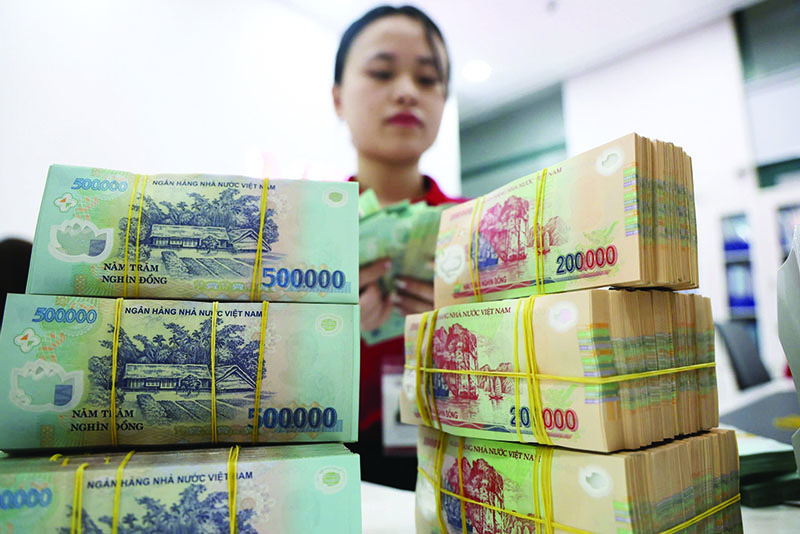 |
Statistics from the Vietnam Banking Association also show that in the first two months of 2025, bad debt increased by about VND 34,000 billion, while the speed of bad debt handling only reached about VND 15,000 billion, mainly due to credit institutions setting aside risk provisions for handling.
“Thus, the source of bad debt settlement mainly comes from credit institutions deducting from risk reserves. This has greatly affected the business results of credit institutions, as well as reducing resources to support businesses, cash flow cannot circulate, affecting liquidity, if not handled promptly,” analyzed Mr. Nguyen Quoc Hung, General Secretary of the Vietnam Banking Association.
According to commercial banks, the failure to legalize the right to seize collateral of credit institutions (stipulated in Resolution No. 42/2017/QH14 on piloting bad debt settlement) has caused many customers to delay paying their debts. According to regulations, banks can file lawsuits to collect debts, but the actual effectiveness is very limited.
Statistics from the Vietnam Banking Association show that many judgments have come into force, but after 27-28 times of enforcement, auctions, and property sales, they still cannot be processed because of the Land Law. Of the more than 40,000 cases that have come into force and have been transferred to enforcement, in 2024, only 15% of the cases will be resolved with small amounts compared to the effective judgment.
Not only that, according to Mr. Dao Manh Khang, Chairman of ABBank's Board of Directors, the bank also faces another difficulty: the litigation process at the district level is transferred to the commune level, causing the bank to encounter obstacles, slowing down the debt collection process and is having to propose and propose a number of coordination mechanisms with local authorities to resolve the issue.
Mr. Tran Minh Binh, Chairman of the Board of Directors of VietinBank, said that bad debts and potential debts may increase in 2025. Therefore, the Bank is proactively controlling and early classifying debts with signs of potential risks.
The Government has just submitted a document to the National Assembly Standing Committee on the Draft Law amending and supplementing a number of articles of the Law on Credit Institutions 2024. The draft Law will codify a number of provisions of Resolution 42/2017/QH14, including codifying provisions on the right to seize secured assets; codifying provisions on the seizure of secured assets of the party subject to enforcement; codifying provisions on the return of secured assets as evidence in criminal cases.
Mr. Nguyen Quoc Hung said that amending and supplementing a number of articles of the Law on Credit Institutions 2024 not only creates conditions for banks to collect debts, but is also a wake-up call for borrowers to be aware and responsible for paying debts, eliminating the mindset of finding every way not to pay debts, finding every way not to hand over assets, finding every way to ask for interest exemption, even borrowing to pay principal and not wanting to pay interest, while the collateral is very large.
However, many National Assembly deputies also said that caution is needed to ensure both the rights of creditors and the rights of debtors. The review report of the Committee on Law and Justice stated that, according to the provisions of current civil law, the right to seize collateral of a credit institution is not an automatic right, but must be established through the terms of the credit contract signed by the parties. Therefore, the majority of opinions in the Standing Committee of the Committee on Law and Justice agreed with the regulation on the right to seize collateral of bad debts.
However, it is recommended that the drafting agency continue to research and supplement necessary regulations to ensure that this activity is carried out publicly and transparently, ensuring the rights and legitimate interests of the person whose collateral is seized as well as related persons.
Some opinions in the Standing Committee of the Law and Justice Committee proposed to consider the regulation on the right to seize collateral assets of bad debts and said that the fact that credit institutions are given the right to seize collateral assets is administrativeizing civil relations and that seizing collateral assets without a court judgment could lead to the risk of infringing on the property owner's ownership rights if not strictly controlled.
MB Shareholders' Meeting: Buy 100 million treasury shares, pay huge dividends, confident about stock price
On the morning of April 26, Military Commercial Joint Stock Bank (MB - Stock code: MBB) held the 2025 Annual General Meeting of Shareholders (AGM).
High dividends in stocks, shareholders are still impatient because capitalization value is not as expected
This morning, MB continued to set a record as one of the banks with the largest number of shareholders attending the General Meeting of Shareholders.
At the General Meeting, the Board of Directors presented a plan to use VND 21,556 billion to pay dividends to shareholders, with a total rate of 35% including two components: 3% cash dividend and 32% stock dividend (issuing more than 1.97 billion shares to pay dividends to existing shareholders).
In addition to paying dividends in shares to increase capital, MB also plans to issue an additional 62 million shares, equivalent to an increase in charter capital of VND 620 billion according to the Resolution of the 2024 Shareholders' Meeting.
After completing the above two plans, MB's charter capital is expected to increase from over VND 61,022 billion to VND 81,368 billion.
The bank said that the additional capital used to supplement investment capital to increase capacity is 7.7 trillion VND (including investment in MB headquarters in the Southern and Central regions and/or other regions with total investment less than 20% of the bank's capital); additional investment in operating capital (new business models, business activities,...) is 12.6 trillion VND.
Another good news for shareholders is that the General Meeting this morning approved the plan to buy back 100 million shares, equivalent to about 1.6% of charter capital. The bank said the source of capital for implementation is from the bank's capital surplus, according to the latest audited financial report; with the order matching method. The expected time of buyback is in 2025 and 2026 after receiving approval from State agencies. The purpose of buying back treasury shares is to "protect shareholders' interests and enterprise value from fluctuations in the stock market; and/or bring benefits to existing shareholders of MB".
Responding to shareholders' questions about why it both paid dividends in shares to increase capital and bought treasury shares (reduced capital), Chairman of the Board of Directors Luu Trung Thai said that according to the plan, this year MB increased its capital by 33%, but buying 100 million treasury shares only accounted for less than 1.2% of capital, not affecting the bank's capital safety ratio. Buying back treasury shares is to prepare for bad situations where problems occur, like in the recent period when the US announced a reciprocal tax policy. This is a tool to support the market, helping to stabilize liquidity and create confidence for investors during volatile periods. This is a solution that MB has implemented in the past and has been very successful.
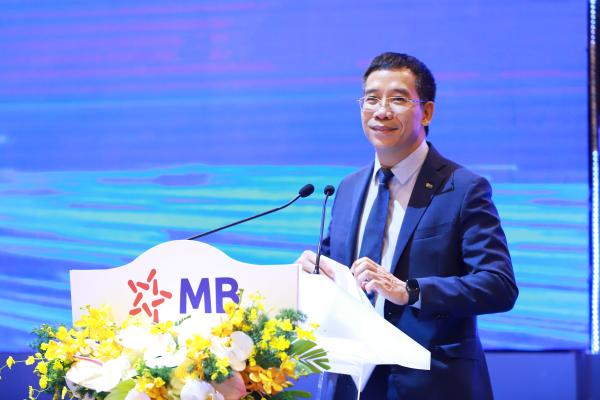 |
Currently, MBB's stock price is still quite low and its growth rate is lower than that of many other joint stock commercial banks. Shareholders are "anxious" to ask that MB needs to have a capitalization plan to be worthy of its intrinsic value, for example, raising the capitalization target to 20-25 billion USD.
Regarding this question, MB Chairman Luu Trung Thai said that MB's current capitalization is 6 billion USD and is planning to increase to 10 billion USD. With the current growth rate, MB's intrinsic value is increasing. MB Chairman advised shareholders "not to be impatient because if we stop paying dividends for only 3 years, the stock price will increase many times over.
Profit target increased by 10%, confident about CASA advantage
Today, MB's General Meeting of Shareholders approved the 2025 business plan: Pre-tax profit increased by 10%; total assets increased by about 21.2%, capital mobilization increased by about 23.3%, credit increased by about 23.7% (depending on the limit of the State Bank of Vietnam).
In 2025, the bank aims to control the bad debt ratio below 1.7%, the capital adequacy ratio CAR in compliance with Base II at a minimum of 9%. Regarding indicators such as ROE (approximately 20-22%), ROA (approximately 2%) or CIR below 30%, it is among the top in the banking industry.
This profit target, according to Mr. Luu Trung Thai, has taken into account the impacts of the US tariff policy. Accordingly, this year, the bank expects credit growth of 24-25%, revenue growth of 20-25% but only sets a profit target of 10% (anticipating the pressure of bad debt increasing due to the group of export enterprises being strongly affected by the trade war).
MB's advantage is its large customer base and large CASA, which allows it to control capital costs well. Mr. Pham Nhu Anh, General Director of MB, said that MB will continue to maintain its leading position with CASA thanks to its large customer base, expected to reach 35 million this year and 40 million in the next few years.
Regarding bad debt, MB leaders said that consolidated bad debt is 1.63%, individual bad debt is 1.35%, although it has increased, it is still low compared to the whole industry. This year, MB plans to increase provisioning costs to protect the bank, pushing the bad debt coverage ratio to over 100%.
This morning, MB's General Meeting of Shareholders also approved the mandatory transfer and continued to implement the contents of the approved mandatory transfer plan (including amendments and supplements).
Specifically, MB will contribute capital to MBV up to VND5,000 billion. Based on the approved plan, MBV can be converted into a limited liability bank with two or more members, a joint venture bank, a joint stock commercial bank, a 100% foreign-owned bank, merged into MB or in other forms in accordance with legal regulations.
Along with that, MB also plans to establish a subsidiary bank in Laos (on the basis of converting MB Laos Branch) and establish branches and representative offices in countries, potential markets, favorable business environments and/or opportunities to develop MB's network (such as Korea, Japan, China, Singapore, Taiwan...).
BIDV Shareholders' Meeting: No plan to participate in establishing a digital asset trading floor, leaving profit plan open
On the morning of April 26, the Joint Stock Commercial Bank for Investment and Development of Vietnam (BIDV - Code: BID) held the 2025 Annual General Meeting of Shareholders.
Q1/2025 profit slightly decreased, cautious with full-year profit target, no plan to participate in establishing a digital asset exchange
This year, BIDV plans to do business with a credit growth target according to the limit assigned by the State Bank of Vietnam (SBV), expected at 16%.
Capital mobilization is managed in accordance with capital use. Pre-tax profit will be subject to approval by competent state agencies, while bad debt is controlled below 1.4%.
The bank said that indicators without detailed data will be updated by BIDV based on approval from competent State agencies.
In the discussion, answering shareholders' questions about the first quarter 2025 profit results, BIDV General Director Le Ngoc Lam said that by the end of the first quarter 2025, BIDV's credit growth was 2.6%, capital mobilization growth was 1.17%. Profit was estimated at VND7,019 billion in the first quarter, down 1.5% compared to the same period last year while bad debt increased slightly to 1.65%.
Explaining the reason for not giving a specific profit target, Mr. Phan Duc Tu, Chairman of BIDV's Board of Directors, said that the global trade war is very complicated, the 90-day tax deferral period has not ended and BIDV is waiting for the negotiation results to come up with a specific scenario.
According to BIDV's review, the total outstanding debt of BIDV's customer group affected by the tariff impact is about VND300,000 billion, accounting for 15% of the bank's outstanding debt. The group of customers that are greatly affected include steel, plastic, plastic, mechanical, seafood, footwear, garment, logistics, industrial park real estate, etc. This outstanding debt includes both direct exporting enterprises and processing and supporting enterprises, industrial parks, etc. that are indirectly affected.
According to the quantification of BIDV's Board Chairman, there are 5 impacts when the US increases the reciprocal tax: credit is narrowed; capital mobilization is reduced (especially deposit mobilization of FDI enterprises); demand for services of the business sector is reduced (due to reduced import and export activities); asset quality is reduced; risk provisioning costs are increased. All of these factors will negatively affect the bank's profit growth.
This year, BIDV continues to plan to set aside VND21,000 billion in risk provisions. This is the same level as in 2024 while credit growth is expected to increase by about 16%, meaning that the bad debt coverage ratio will decrease.
In response to a shareholder's question about the merger of two branches in Binh Duong and Ca Mau, BIDV's Chairman said that, up to now, BIDV has only merged two branches out of a total of 300 branches, which is not many. However, arranging a business model with a bank is a regular task, never constant, including location and business network. Currently, there are many factors such as: digitalization trend, labor productivity, cost reduction requirements, increased management efficiency... that make the adjustment towards increasing modern, digital models instead of widespread distribution channels as present will happen faster.
A shareholder asked about the information that BIDV is participating in establishing a digital asset trading floor (the draft is being developed by the Ministry of Finance - PV), BIDV's leader said that, as a domestic commercial bank, BIDV will actively participate with ministries and branches to implement. However, the establishment of a BIDV digital asset trading floor will be "reserved" for the private enterprise sector.
"BIDV has no plans to establish a company to deploy this exchange, because it requires a large amount of capital, not to mention technology and other factors. However, BIDV will participate in the market as a bank, serving payment and related operations," BIDV leaders affirmed.
Dividend 30.8% to increase capital
BIDV shareholders' meeting today approved the plan to increase charter capital by VND 21,656 billion, to nearly VND 91,870 billion (equivalent to 30.8%) through 3 options: increasing capital from the reserve fund supplemented with charter capital, paying dividends and issuing more.
Regarding the stock issuance plan to increase capital from the additional reserve fund, BIDV will issue a maximum of more than 498,516,696 shares (equivalent to 7.1% of shares circulating at 31/3).
 |
With the stock issuance plan to pay dividends from an unprocessed accumulated profit in 2023, BIDV plans to issue maximum of nearly 1,397,251,021 shares (equivalent to 19.9% of the shares circulating at 31/3).
Finally, there is the option of issuing additional shares to investors through private offering or public offering with a maximum quantity of 269,846,330 million shares (equivalent to 3.84% of outstanding shares as of March 31).
Subjects offering individual stocks are investors who meet the criteria of professional securities investors and domestic and foreign organizations with financial potential, which may include one or some existing shareholders of BIDV.
The General Meeting of Shareholders authorized the Board of Directors to decide in detail the professional securities investor to meet the requirements and the number of shares offered to each investor.
In principle, the price determination, the price of a separate -selling stock ensures not lower than the market price at the time or value stated in the book book at the nearest time.
Sensory offering shares will be restricted to 3 -year transfer to strategic investors and 1 year for professional investors.
The implementation time of all three of the above expected options in 2025 - 2026. The General Meeting of Shareholders authorized the Board of Directors to decide the time of specific issuance after receiving the approval of state agencies.
The increased charter capital is expected to be used entirely to supplement business capital and allocated to BIDV's business operations.
Vietcombank Shareholders' Meeting: Cautious profit target, 6.5% capital sale still waiting for investors
In 2025, Vietcombank targets consolidated profit growth of only 3.5%. The expected billion-dollar capital sale still depends on market developments and investor interest.
This morning (April 26), Joint Stock Commercial Bank for Foreign Trade of Vietnam (Vietcombank - Code: VCB) held its 2025 Annual General Meeting of Shareholders at Vietcombank Human Resources Training and Development School.
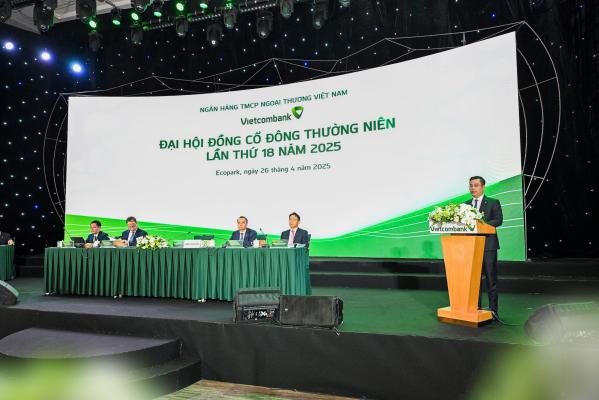 |
One of the most important proposals submitted to the Congress for approval is the plan to issue individual shares (6.5% of capital) to increase charter capital, in order to supplement resources for business operations. This plan has been proposed by Vietcombank for many years but has not been successful.
According to the proposal, the bank will privately offer a maximum of 543.1 million shares at a par value of VND10,000/share to a maximum of 55 investors, including strategic investors and professional securities investors. The total offering value at par value is a maximum of VND5,431 billion.
The private offering of shares to increase 6.5% of charter capital at the time of the offering can be carried out in one or more offering rounds in 2025 - 2026. The specific timing and number of shares offered for each offering round will be based on the actual purchasing demand of investors.
Privately offered shares are subject to transfer restrictions of at least 3 years for strategic investors and at least 1 year for professional securities investors from the date of completion of the offering.
According to Mr. Nguyen Thanh Tung, Chairman of Vietcombank's Board of Directors, the bank's continued implementation of this private offering is to improve its financial capacity, competitiveness and is consistent with the bank's development strategy.
Vietcombank said that if the strategic shareholder - Japan's Mizuho Bank increases its ownership ratio to 20%, it will be able to nominate one more member to the Board of Directors, but no more than two people. Other foreign investors, if owning 5% or more of capital, also have the right to nominate one member to the Board of Directors. The nomination and holding of power in the Board of Directors by major shareholders will all be based on the approval of the State Bank. If the above-mentioned individual plan of 6.5% of capital is completed, Vietcombank's charter capital is expected to be increased from VND83,557 billion to nearly VND88,988 billion.
Responding to shareholders about the progress of capital sale, Mr. Le Hoang Tung, Deputy General Director of Vietcombank, explained that the capital sale plan was proposed for many years but was not successful due to the unfavorable environment and the failure to find suitable investors as expected. However, in 2024, the economic recovery is a suitable condition to restart the capital increase plan and approach a number of potential investors. According to Mr. Tung, the initial response to finding investors has been positive, but whether the deal will be completed in 2025 or not depends largely on the macro context and investor interest.
Regarding the 2024 dividend plan, Vietcombank said it will use all remaining profits to pay dividends, but did not mention the form and rate of dividend payment and said it must wait for approval from competent state agencies.
In 2025, Vietcombank aims for cautious profit growth. Specifically, consolidated pre-tax profit will increase by 3.5%; individual profit is expected to reach VND42,734 billion and will be adjusted according to the State Bank's opinion after receiving comments from the Ministry of Finance; total assets will increase by 10%; Capital mobilization from market 1 is expected to increase by 8% and will be adjusted in line with assigned credit growth. Credit is expected to increase by a maximum of 16.28% and will be implemented according to the State Bank's announcement.
Updating the business results of the first quarter of 2025, Mr. Le Quang Vinh, General Director of Vietcombank, did not give specifics but only said that all business indicators have grown well, especially credit and international trade finance activities. Since the beginning of the year, credit has grown well thanks to signing many large contracts, capital mobilization has grown steadily. Thanks to that, profits continue to grow compared to the same period.
Regarding the impacts of the US reciprocal tax policy, Chairman Nguyen Thanh Tung said that the impact of reciprocal tax on Vietcombank is quite obvious because Vietcombank currently accounts for about 20% of the market share in international payments and trade finance throughout the system. Many of Vietcombank's customers are enterprises exporting to the US, especially in high-tax sectors such as electronics, wood, seafood, plastics, etc.
In addition, Vietcombank's FDI customer portfolio is larger than other banks, accounting for more than 20% of total wholesale loans, more than 40% of total capital mobilization and more than 50% of international trade finance accounting revenue. This makes Vietcombank perhaps more affected than many other banks.
In this situation, Vietcombank said it has proactively coordinated with customers to come up with solutions to minimize the impact, including financial support and diversifying export markets. At the same time, Vietcombank has also actively coordinated with management agencies to have appropriate orientations for each industry and each customer group.
The bank recently signed a financing agreement for Vietnam Airlines to purchase 50 Boeing aircraft from the US. This move not only supports domestic businesses, but also contributes to reducing the trade balance gap between Vietnam and the US, which can help reduce pressure from US policies.
Sacombank Shareholders' Meeting: Not buying back SBS Securities Company, actively handling 32.5% of Mr. Tram Be's shares
At the Sacombank General Meeting of Shareholders on April 25, the Bank submitted to the General Meeting of Shareholders a plan to contribute capital/purchase shares of a securities company to become a subsidiary of Sacombank. The ownership ratio of charter capital/shares at the securities company is over 50%.
Facing the shareholder's question about whether Sacombank intended to buy SBABon Securities Company under Sacombank before, but the bank had divested capital, Mr. Duong Cong Minh said that the bank would not buy this securities company.
Ms. Nguyen Duc Thach Diem, Permanent Vice Chairman of Sacombank's Board of Directors also said that the bank had previously had securities company very early, but then sold capital at SBS. Now Sacombank has found many opportunities, so he planned to buy securities company, but the bank did not need to buy back the capital of SBS securities company, but choose a new securities company.
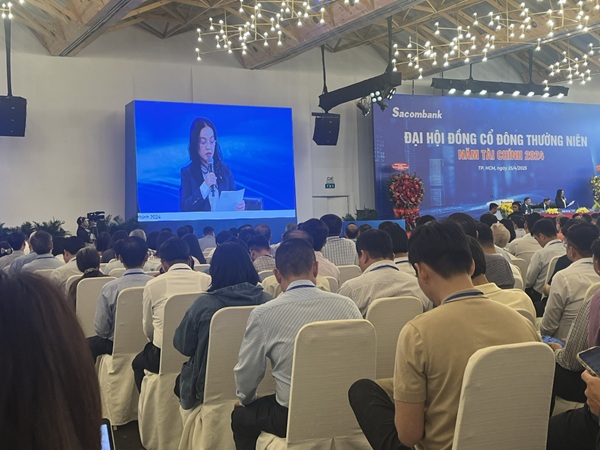 |
Standing Vice Chairman Sacombank also said that the bank will find securities companies that meet the basic standards such as: Clearly transparent financial statements, clear assessment of asset quality; full of supply operations for investors; appropriate capital size. Stable operation system, capable of connecting with partners; Priority is given to the listed securities company.
Responding to a shareholder's question about why Sacombank has not yet been able to handle 32.5% of Mr. Tram Be's shares, Sacombank's Standing Vice Chairman Nguyen Duc Thach Diem said that for the debts secured by 32.5% of STB shares of Mr. Tram Be and related persons, Sacombank has submitted settlement plans and is waiting for approval from the State Bank (SBV). The SBV inspectorate also highly appreciated Sacombank's restructuring plan, but the bank is still waiting for SBV's opinion.
Specifically, the principal debt of the group of shares of Mr. Tram Be and related parties accumulated from 2017 to the end of 2024, Sacombank has recovered 25,612 billion VND. The remaining debt is 12,037 billion VND, of which the debt sold to VAMC is 10,538 billion VND, the receivable is 1,454 billion VND. The total interest payable under the contract up to the end of 2024 is 57,605 billion VND.
The total number of shares securing the repo loan is equivalent to 32% of Sacombank's STB shares. However, all principal and repo loans have been 100% provisioned by Sacombank. The amount collected must handle all capital and interest and will be submitted to the State Bank, with the interest of 57,000 billion VND.
Sacombank has made a 100% provision for the principal balance of the above bad debt and has completely withdrawn the accrued interest from the end of the second quarter of 2022. Ms. Diem said that the approval for Sacombank to handle the stock lot as well as record the completion of restructuring will take time.
The plan to handle these shares is still difficult. Many years ago, Sacombnak also submitted a plan to handle them, but there were many difficulties so it was not approved. In 2024, STB submitted a plan in accordance with legal regulations, proposing a plan to buy back the debt sold to VAMC and re-auction it through an independent company.
According to Sacobank, the Bank is ready in terms of both responsibility and obligation, waiting for the State Bank to approve the restructuring project. If approved, it will proceed to handle the shares of Mr. Tram Be and related people, complete the obligations, and submit procedures to pay dividends to shareholders in shares to increase capital.
The capital source is from the accumulated undistributed consolidated profit until 2024. Specifically, the Bank's pre-tax profit reached VND 12,720 billion, consolidated after-tax profit was VND 10,087 billion. After setting aside funds, the Bank has more than VND 7,013 billion left. Combined with VND 18,339 billion of retained consolidated profit from the previous year, Sacombank has more than VND 25,352 billion of accumulated retained consolidated profit.
The Standing Vice Chairman of Sacombank's Board of Directors also said that if the State Bank approves the restructuring project, the Bank will proceed to handle the shares of Mr. Tram Be and related people, complete the obligations and then submit the procedures to pay dividends.
Investors assessed that Sacombank's action to submit a proposal to increase its charter capital is a positive sign, showing that this bank is very confident in its capacity and is ready for larger-scale development strategies. STB's stock price closed the trading session on April 22 with a sharp increase, surpassing the 40,000 VND/share mark.
The Sacombank restructuring project (after the merger with Southern Bank) was approved in 2016. Over the past 9 years, Sacombank has been actively handling bad debts and outstanding assets, while enhancing profit recovery. In 2024, Sacombank recovered and handled nearly VND 10,000 billion of bad debts and outstanding assets, increasing the cumulative amount to VND 103,988 billion, of which VND 76,695 billion belonged to the Project. As a result, the outstanding amounts under the Project decreased by 80.5% in scale and 25.7% in proportion compared to the time of implementation, currently accounting for only 2.4% of total assets.
Of which, for debts belonging to Phong Phu Industrial Park, Sacombank successfully auctioned the debt after 18 auctions in 2023, with a selling price of VND 7,934 billion, higher than the customer's debt obligation. To date, Sacombank has actually collected VND 1,587 billion and the rest will be collected according to the legal progress of the Project (expected to collect an additional 30 - 40% in 2025 and the rest will be collected completely in 2026).
TPBank Shareholders' Meeting: Ambitious profit target, Chairman frankly answers a series of hot issues
On the morning of April 24, 2024, Tien Phong Commercial Joint Stock Bank (TPBank - Ticker: TPB) held the Annual General Meeting of Shareholders in 2025.
Ambitious profit goals: profit increased by 18%, dividend of 15%
In his opening speech, Mr. Do Minh Phu, Chairman of the Board of Directors of TPBank, said that in 2024, TPBank will successfully complete all targets assigned by the General Meeting of Shareholders, continuing to maintain its leading position in digital banking. In particular, pre-tax profit in 2024 will increase by 36%, among the highest in the banking system.
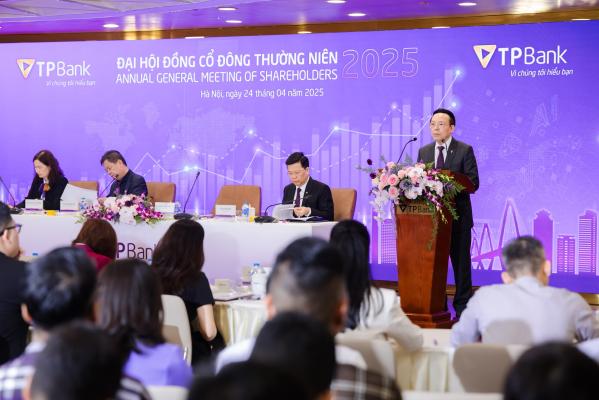 |
In 2025, TPBank set a target of profit before tax reached VND 9,000 billion, up 18.4% compared to 2024. Total assets in 2025 are expected to reach VND 450,000 billion, up 7.6%. Capital mobilization is expected to increase by 12.3% to 420,000 billion dong. Outstanding loans and bonds of economic organization increased by about 20% to 314,750 billion dong.
In the context of the world and domestic economy, there are many challenges and instability, Mr. Do Minh Phu admitted that the goal of profit growth is ambitious and challenging, but also the responsibility and determination of the Board of Directors and the Executive Board.
"We will closely monitor, if the economy has great fluctuations, we will consider adjusting but the goal is to try to achieve this growth," Mr. Phu said.
With a credit growth target of 20% this year, TPBank is among the group of commercial banks granted the highest credit growth limit in the banking system (except for the group of banks participating in the mandatory transfer of weak banks).
Mr. Nguyen Hung, General Director of TPBank added that, in the context of increasing interest from interest, TPBank is increasing the proportion of interest in interest. In 2024, for the first time, the income outside the profit on the total bank income reached 30%. In the context that most banks depend on credit income (many banks with 85-90% credit rates), TPBank's 70% is encouraging.
At the end of the first quarter of 2025, TPBank recorded profit before tax reached more than VND 2,100 billion, up 15% over the same period last year. The total operating income of TPBank in the first quarter reached nearly VND 4,500 billion. In particular, net income from service becomes a bright spot when increasing by 27% compared to the first quarter of 2024, pushing the density of service income in total operating income to over 20%, compared to 15% in the same period last year. This is a clear evidence for the business strategy to gradually reduce the dependence on TPBank's credit is promoting effectively, in order to diversify revenue sources, while minimizing risks and increasing business sustainability.
Total capital mobilization in the first quarter reached VND337,800 billion, up 7% over the same period. Meanwhile, outstanding loans in market 1 reached more than VND271,500 billion, up sharply by 28% over the first quarter of 2024. Customer loans alone reached more than VND263,100 billion, up 30% over the same period in 2024. Credit growth rate in the first quarter reached 3.75%, higher than the industry average (2.5%; as of March 25). This is a positive result in the context of the banking industry just starting to recover credit.
Regarding the participation in restructuring Handico Finance Joint Stock Company (HAFIC), TPBank's leaders said that this has been a long-term task of TPBank and is waiting for the State Bank's plan to participate in support. In the first quarter of 2024, TPBank also completed the acquisition of Viet Cat Fund Management Joint Stock Company (VFC) with a current shareholding ratio of 99.9%. By the end of 2024, TPBank owns 9.01% of capital at Tien Phong Securities Joint Stock Company (TPS), with a real capital contribution value of VND 270.3 billion. Currently, Viet Cat is a subsidiary in TPBank's ecosystem.
Strongly innovate technology, can reduce 300-500 more employees
To achieve the ambitious growth target, the Chairman of TPBank's Board of Directors said that from the beginning of 2025, the bank has set a goal of comprehensive innovation, including: Innovation in organizational structure, regulatory processes, innovation in the fundamental field of digital banking activities; innovation in business methods. The innovation aims to optimize, reduce costs, and improve business performance.
Mr. Nguyen Hung, General Director of TPBank, added that TPBank is a leading bank in turning into a digital bank and is continuing to maintain the leading position in digital banks. The continuation of digitization and technology application has helped the bank save costs, so that the CIR of the bank in 2024 decreased in nearly 35% (from more than 41% in 2023).
In 2024, TPBank added 500 robots to automate processes, thereby saving time, costs, and human resources. Accordingly, in 2024, the bank's plan is that the number of employees can reach 8,200 people, but in reality, by the end of 2024, the bank's staff will only be 7,700 people and still complete all growth targets.
In 2025, the bank continued to renovate technology and apply AI in operation to innovate the process and streamline the apparatus. It is expected that the renovation of the process, streamlining the apparatus will help TPBank reduce the reduction of 300-500 personnel, thus continuing to reduce operating costs, optimize operation.
Not only reducing costs, the application of new technology also opens up many business opportunities for the bank. In 2024, TPBank had about 1.3 billion transactions on the digital channel (more than 100 million transactions per month), over 98% of the transactions at TPBank took place on the channel.
"The previous channel did not bring direct profits to the bank but mainly to increase the utility for customers. However, now, combined with e -commerce, digital transformation, digital channel is opening up great opportunities and potentials for banks and banks that will have a great competitive advantage," General Director Nguyen Hung said.
By the end of 2024, TPBank will have 14.1 million customers. Two years ago, TPBank invested in an information technology system and deployed lending on digital channels. To date, the bank has had 4.5 million customers borrowing capital on digital channels. Profits from lending activities on digital channels have been enough to offset technology investment costs and have begun to contribute well to both fees and interest for the bank.
According to the General Director of TPBank, if with the traditional business model, bad debt for consumer loans at 10% is an acceptable number, when lending on digital channels, bad debt for consumer loans of TPBank is only around 2%. Not only does it control credit quality better, but using AI to score helps the bank process a large number of loans at the same time, disbursing loans within a few hours. According to the assessment of TPBank's leaders, lending on digital channels still has a lot of potential for development because the market demand is very large.
Strong digital transformation also helps TPBank become the bank with the highest growth rate in attracting demand deposits (CASA) in the system. In 2024, TPBank's CASA will increase by 14.4%. Currently, CASA accounts for 22% of TPBank's total mobilized capital. In the context that banks' capital sources depend on deposits from residents and economic organizations - mostly term deposits - banks with high CASA ratios like TPBank will help banks improve their competitiveness, reduce capital costs, thereby reducing interest rates according to the Government's policy while still maintaining profit margins.
Three consecutive years dividing cash dividends for shareholders, increasing charter capital
One of the most interesting proposals for shareholders at TPBank's General Meeting of Shareholders this year is the proposal on the cash dividend payment plan and the charter capital increase plan in 2025.
Accordingly, TPBank proposed a 10% dividend in cash (1 stock received 1,000 dong) from the untreated profit after setting up funds as of December 31, 2024, according to the 2024 consolidated financial statements that were audited by the bank. After being approved by the General Meeting of Shareholders, the Board of Directors will determine the specific implementation time, ensuring in accordance with the regulations.
HDDQT also proposes to divide dividends by stock at 5%, through issuing more than 132 million shares to existing shareholders. Shares issued to pay dividends are not restricted. The source is taken from untreated profits after making funds as of December 31, 2024, according to the consolidated financial statements in 2024, audited by the bank.
After the issuance, TPBank's charter capital will increase by a maximum of VND1,320.9 billion, from VND26,420 billion to more than VND27,740 billion.
This is the third consecutive year that TPBank has paid dividends in both cash and shares.
At the Annual General Meeting of Shareholders in 2024, the Board of Directors also made shareholders very excited when suddenly announcing the plan to spend 25% dividends in cash and stocks at the congress.
Earlier, in 2023, the bank also spent VND 4,000 billion to dividend in cash in a ratio of 25% (shareholders owning 1 share received 2,500 VND) and a bonus stock of 39.19% for shareholders.
During the discussion, shareholders asked questions about the impact of the trade war on TPBank's growth as well as credit growth momentum.
Mr. Nguyen Hung, General Director of TPBank, said that the export market, especially exports to the US, are facing many difficulties due to factors from the trade war and tariffs. TPBank's total outstanding credit balance for import-export customers related to the export market to the US is about VND10,800 billion. However, sales from the US market only account for less than 20% of these businesses, so the impact is not too great. However, the bank has also developed response scenarios in case the market experiences chain reactions due to tax policies.
Regarding credit growth, this year, TPBank has been allocated a credit limit of 15.85% by the State Bank, higher than the industry-wide target. Not to mention that there may be adjustments, so the bank is not worried about a lack of credit room in the near future.
"The credit growth rate in the first quarter reached 3.6%, compared to the industry average of only 2.5%, showing that our growth rate is much higher. Until recently, credit has increased by 4.5%. Most of the credit is disbursed into production and business sectors, consumer loans such as buying houses, buying cars, etc. Large projects, especially in the real estate sector, still have unclear development implementation, so the bank is still cautious in lending. We will continue to go in the right direction, ensuring that credit activities are carried out safely and sustainably," said Mr. Nguyen Hung.
Regarding the shareholder's question about "the bond lot of Hung Thinh Quy Nhon Entertainment Services Joint Stock Company (code HQNCH2124005), the General Director of TPBank affirmed that Capital Securities Joint Stock Company (CASC) is the issuing agent, the depository registration agent, and the representative of the bond owner. Joint Stock Commercial Bank for Foreign Trade of Vietnam (Vietcombank) - Tan Dinh Branch is the collateral management agent. TPBank is not related to this bond lot. The shareholder said that in May 2021, Tien Phong Securities Joint Stock Company (TPS) assumed the role of the issuance consultant for the bond lot with code HQNCH2124005. The shareholder said that TPBank contributed capital to TPS so it must be responsible. However, the General Director of TPBank said that shareholders who buy the bond lot from which source need to work with that unit to find a solution. TPBank is only a capital contributor to TPS and only takes 9.01% of the company's capital, so TPS is not a subsidiary or affiliate of TPBank.
"The bank is not involved, so even if it wanted to, it cannot be resolved," Mr. Nguyen Hung affirmed.
At the Congress, there were shareholders asking questions about the plan to invite foreign strategic shareholders. Mr. Do Minh Phu said that TPBank has now closed foreign room. However, if TPBank is increased by the maximum ownership of foreign countries, Mr. Phu believes TPBank is a bank that is attractive to foreign investors.
HDBank sets 2025 profit target of over VND 21,000 billion, launches HD Financial Group
On April 24, Ho Chi Minh City Development Joint Stock Commercial Bank (HDBank - stock code: HDB) held its 2025 Annual General Meeting of Shareholders. HDBank is transforming itself strongly to create HD Financial Group - a modern, multi-functional financial banking group, integrating technology and comprehensive services.
Speaking at the congress, Mr. Kim Byoungho - Chairman of the Board of Directors of HDBank said that 2024 is the year of courage, efficiency and trust. Overcoming many economic and financial fluctuations, HDBank continues to orientate towards sustainable development, effective risk management and comprehensive growth.
Pre-tax profit reached VND 16,730 billion, up 28.5% compared to 2023, exceeding the set plan. Total assets reached VND 697,366 billion, up 15.8%; outstanding credit reached VND 437,731 billion (+23.9%); capital mobilization reached VND 621,119 billion (+15.7%). ROE reached 25.71%, ROA reached 2.04%, maintaining in the group of banks with the highest efficiency. The bad debt ratio was controlled at a low level (according to Circular 11) of only 1.48%, along with other safety indicators at a positive level.
Notably, Moody's has upgraded HDBank's baseline credit assessment (BCA) to Ba3 - one of the highest in the Vietnamese banking system, recognizing the bank's management efforts, operational efficiency and sustainable growth potential. At the end of 2024, HDBank will receive Dong A Commercial Joint Stock Bank under the transfer plan of the Government and the State Bank - a milestone demonstrating HDBank's financial capacity, reputation and pioneering spirit.
At the same time, Vikki digital bank was officially born, operating independently, financially and growing rapidly, contributing to expanding HDBank's comprehensive digital ecosystem.
In 2025, HDBank sets ambitious business targets for 2025. Pre-tax profit is expected to reach VND 21,179 billion, up 27% - one of the highest increases in the industry. ROE is expected to reach 26.2%, ROA to reach 2.15% - continuing to maintain its position as the leading efficient bank.
Total assets are expected to reach VND890,442 billion (+28%), outstanding credit balance is VND579,851 billion (+32%), capital mobilization is VND792,812 billion (+28%). Bad debt ratio is controlled below 2%, ensuring system stability and safety.
Regarding dividends, HDBank reported that the distributable profit in 2024 is VND10,396 billion, corresponding to an expected dividend payout ratio of 28%. However, in the context of market fluctuations, the bank will be flexible, cautious and seek shareholders' opinions at the right time to ensure financial capacity for long-term sustainable development.
The congress also officially announced the development strategy of HD Financial Group, including member units: HDBank - Main commercial bank, Vikki Digital Bank - New generation digital bank, HD SAISON - Consumer finance, HD Securities - securities, HD Insurance - Insurance, HD Capital - Fund management, Dong A Money Transfer - Remittance service.
With more than 30 million customers, a network of more than 600 banking transaction points and 26,500 financial points, and pioneering technology capabilities, HD Financial Group aims to bring seamless, diverse, fast and effective financial experiences to people and businesses across the country and internationally.
Speaking at HDBank General Meeting of Shareholders on April 24, PhD. Nguyen Thi Phuong Thao shared: "We are not only proud of the numbers, such as the target of profit in 2025 more than VND 21,000 billion, the total assets are looking to VND 1 million billion, but more importantly, the belief in the future of an HDBank develops firmly, transparently and towards international standards."
According to Thao, HDBank always acts for the transparency and the foundation of belief. And it is that belief that is an invaluable asset for HDBank to constantly attract investors, improve the position in the market and create sustainable value for all shareholders.
"If shareholders invest 1 dong in HDBank at the IPO, by the end of 2024, this amount will increase by 4.4 times. That is also the reward and happiness for the Board of Directors when we can bring the best and most sustainable values to our shareholders, in addition to profit growth. In addition to profit growth, HDBank is committed to optimizing capital efficiency, maintaining a high and stable dividend policy, and investing in the future with digital platforms, green finance and a strategy of deep integration into the national economic value chain," said Ms. Thao.
 |
According to Thao, for many years, HDBank steadfastly built a business management model according to international practices, bringing high growth value to investors: strengthening the independent role of the Board of Directors; Transparency in information disclosure and risk management; Strictly comply with legal regulations, ethical standards and harmonious benefits between shareholders, customers and the community.
According to Ms. Thao, HDBank not only wants to become a leading bank in terms of scale, but also a bank chosen first for its quality, humanity, and kindness in every strategic decision. HDBank does not stop at market share or profit, but rather becomes a symbol of trust in the modern - transparent - sustainable Vietnamese economy.
"Today's Resolution, we are committed to implementing and exceeding the expectations of the indicators we have passed at the Congress. That is also the commitment as well as the beginning of our Board of Directors," Thao added.
In 2025, HDBank sets up business goals for 2025. Profit before tax is expected to reach 21,179 billion dong, up 27% - one of the highest increase in the industry. ROE expects to reach 26.2%, ROA reaches 2.15% - continues to maintain the leading bank position. Total assets towards 890,442 billion dong (+28%), credit balance reached 579,851 billion dong (+32%), mobilized capital of 792,812 billion dong (+28%). Bad debt ratio is under 2%control, ensuring system stability and safety.
Source: https://baodautu.vn/ngan-hang-ram-ro-dai-hoi-co-dong-lo-tien-gui-chay-sang-kenh-dau-tu-khac-d273825.html




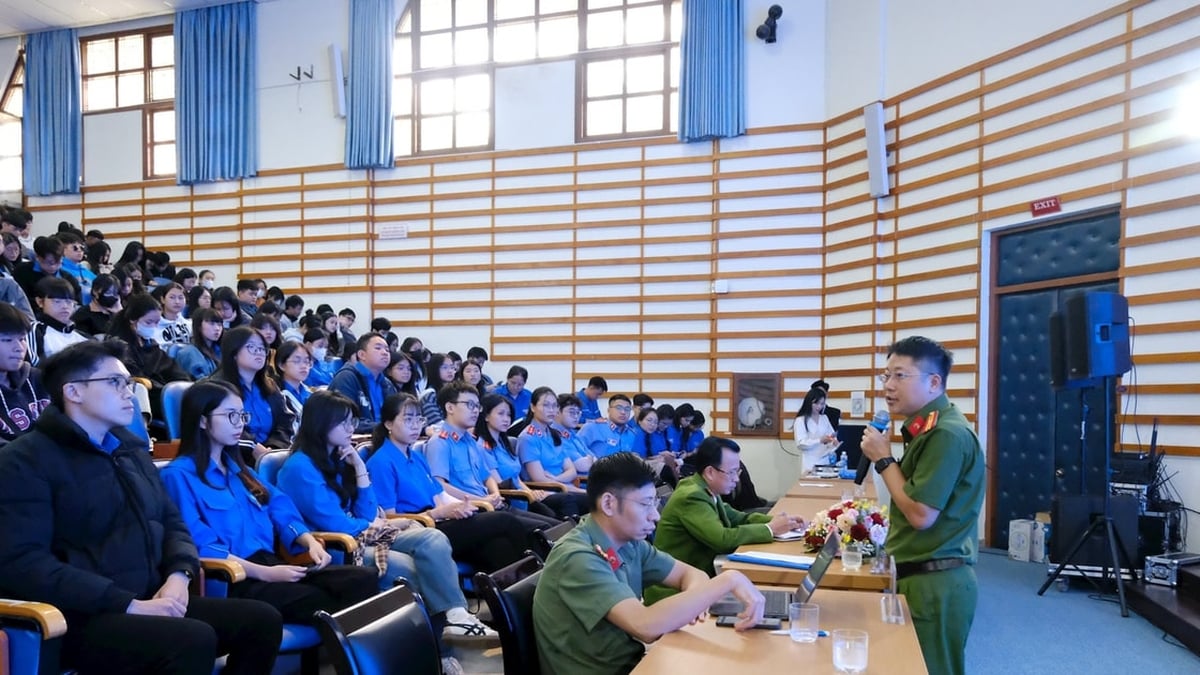



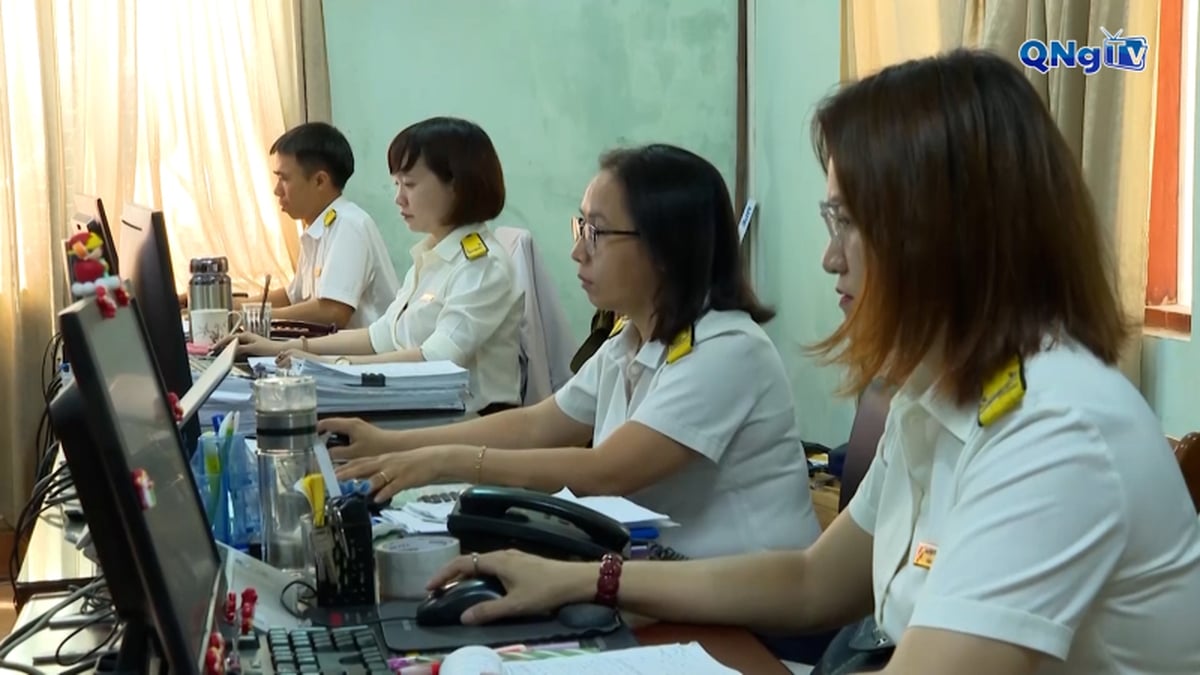
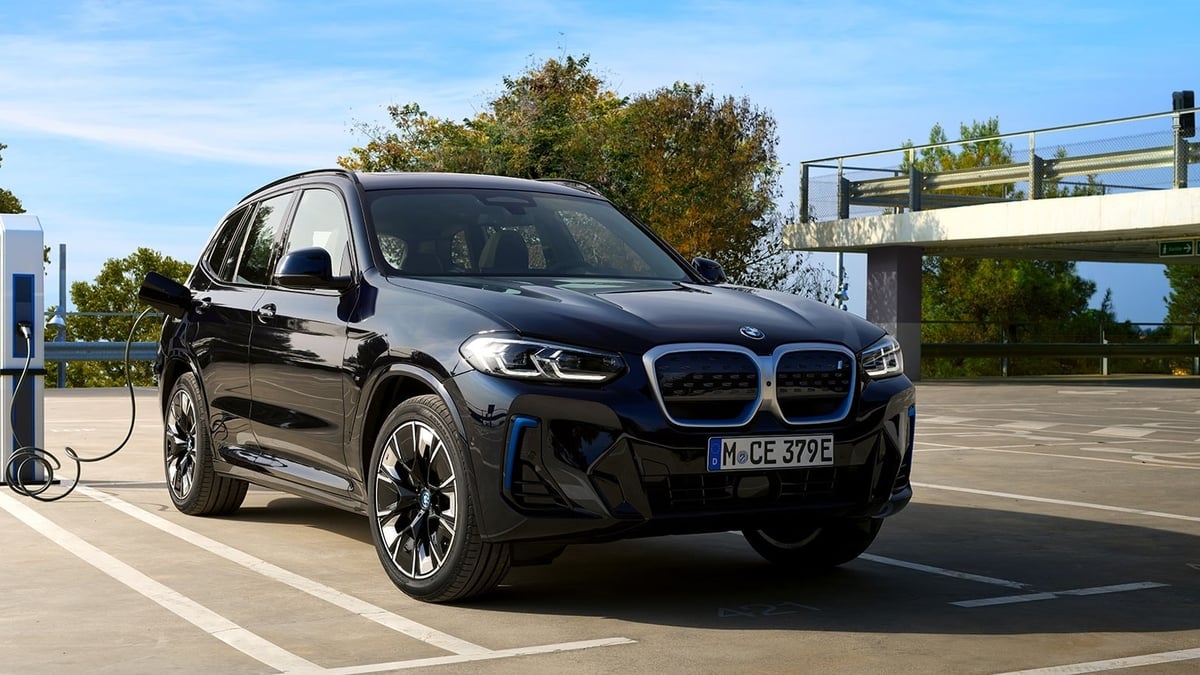
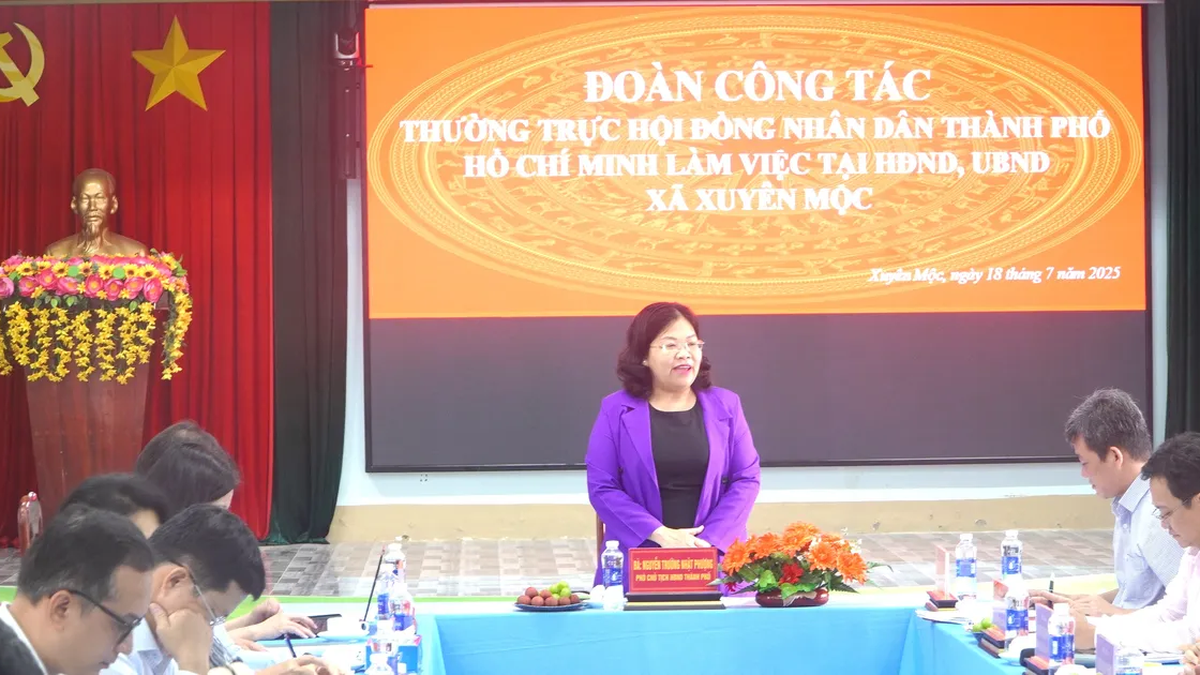
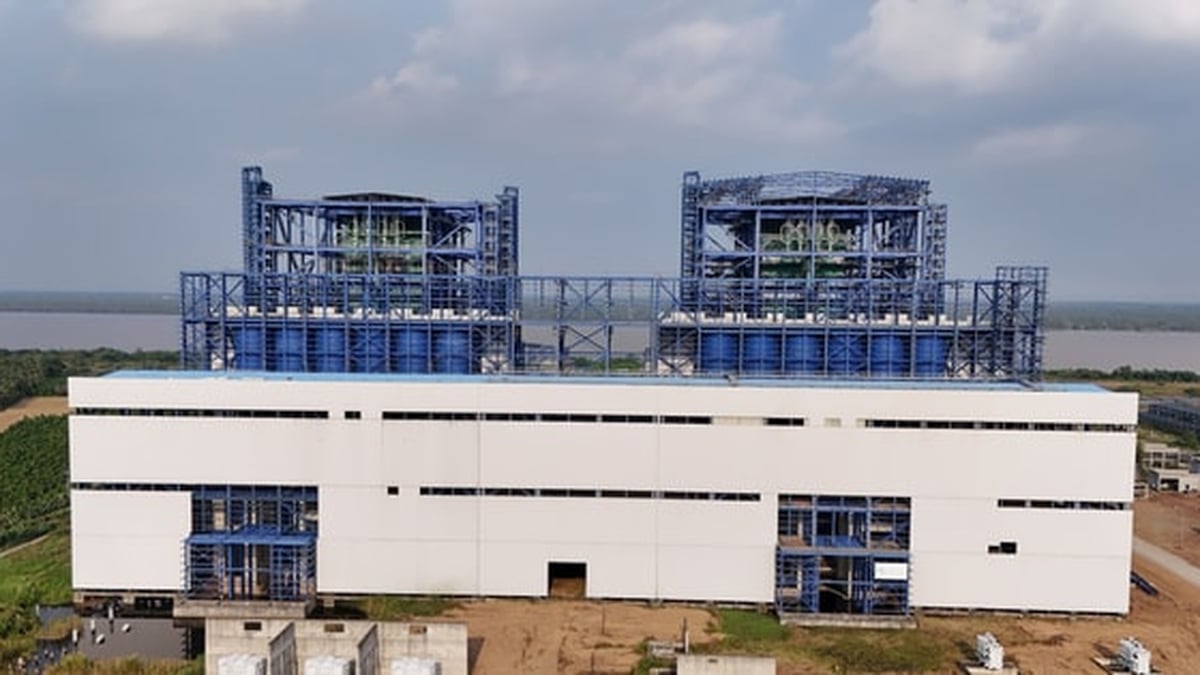
















































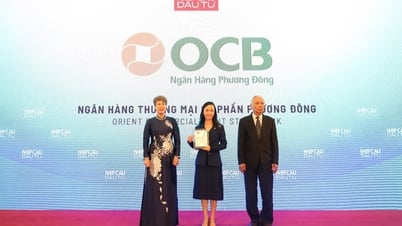





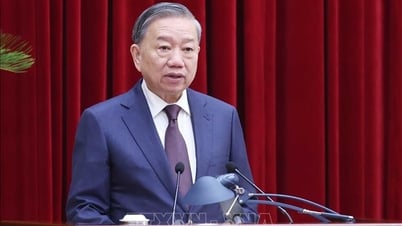



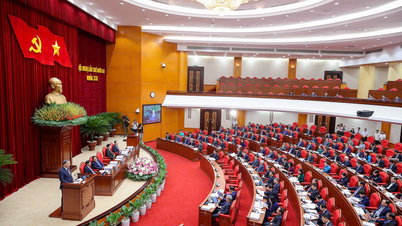
























![[Infographic] In 2025, 47 products will achieve national OCOP](https://vphoto.vietnam.vn/thumb/402x226/vietnam/resource/IMAGE/2025/7/16/5d672398b0744db3ab920e05db8e5b7d)







Comment (0)